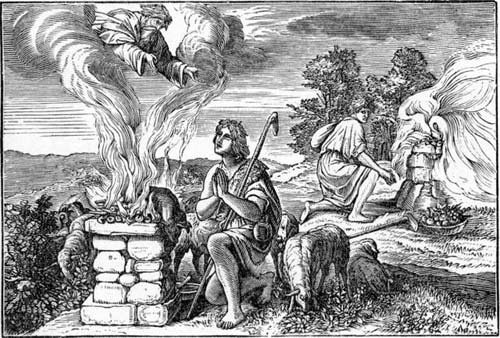Luke 10:21-37
August 26, 2018
The Law does not nullify the Promise. St. Paul makes it explicitly clear in our Epistle lesson that the inheritance of eternal life is given by promise to those who believe in Jesus Christ. And if the inheritance is given by promise, then it cannot be obtained by works of the law, as the Apostle says, “For if the inheritance comes by the law, it no longer comes by promise; but God gave it to Abraham by promise.” It cannot be both. It is either by works of the law or by promise, that is, as a free gift from God.
St. Paul goes further in his explanation by reasoning that the law, which came 430 afterward, did not annul the covenant previously ratified by God. Let me refresh your memory of Old Testament history. God called Abraham out of his father’s country and promised to make a great nation out of him and that in him all families of the earth would be blessed. He had Abraham look at the promised land and said he would give it to him and to his offspring forever. This offspring, St. Paul tells us, is Christ Jesus himself, through whom all families of the earth are blessed. Abraham believed God’s promise and through his faith, he received what was promised to him, namely an eternal inheritance. This is why St. Paul writes, “So then, those who are of faith are blessed along with Abraham, the man of faith.” (Galatians 3:9)
430 years after Abraham received this irrevocable promise from God, God through Moses gave the law to Israel, the nation, which descended from Abraham. God did not give the law as a second path to obtain this inheritance. There can only be one way to receive the inheritance of eternal life. And if it is by the law, then not only does God contradict what he said to Abraham, but this creates a huge problem for those who lived before the law was given!
If one receives the inheritance of eternal life through works of the Law, what happens to Abraham, Sarah, Isaac and Rebecca, Jacob and his wives and children and all the people of Israel who lived before the law was given? Or for that matter, what about Adam and Eve, Abel, Seth, Enoch, and Noah. How could these people obtain their eternal inheritance by a law, which had not been given to them?
The promise given to Abraham that through his seed all families of the earth would be blessed is no different than the promise given to Adam and Eve in garden. The offspring of the woman, who would crush the head of the serpent is the one and the same offspring of Abraham, through whom all families are blessed. God promised to all these generations an inheritance to be received by faith long before he gave the law.
So, there must be something wrong with the law, right? Certainly not! The law is good and wise. The entire law can be summed up in two simple sentences: “Love the Lord your God with all your heart and with all your soul and with all your strength and with all your mind. And love your neighbor as yourself.” The law expresses the holy will of God. There is no greater work you can do than to love God with all your heart. And to treat your neighbor as you would have him treat you is how God desires you to live at all times. So, what’s wrong with the law? Why can’t it give us the inheritance of eternal life? Didn’t Jesus himself say to the lawyer, “Do this, and you will live.”?
The problem lies in us: Sin. Sin, which corrupts each and every one of us caused St. Paul to lament, “The very commandment that promised life proved to be death to me.” (Romans 7:10) The problem is not that there is anything lacking in the law or commandment. The problem is that we do not have the ability to do what the law requires. “Do this and you will live.” That sounds quite simple. It’s certainly easy to understand! Yet, it is impossible to do. King Solomon says in Ecclesiastes chapter 7, “Surely there is not a righteous man on earth who does good and never sins.” (vs. 20) And St. Paul declares in Romans 3, “For all have sinned and fall short of the glory of God...” (vs. 23)
“Do this and you will live.” Quite easy to say. Impossible to do. And the lawyer knew this or at least he learned it. Desiring to justify himself, something only God can do, he asked Jesus, “And who is my neighbor?” Why did he ask this question? Because the commandment, “Love your neighbor as yourself” is too difficult. It can’t possibly mean love everyone! That would be impossible! Perhaps if Jesus would narrow it down a little bit, then he could focus on a smaller pool of people to love. That would be more manageable. Perhaps, then he could fulfill the demands of the law to “love your neighbor as yourself.”
But you can’t modify the law to make it easier. The law demands perfect devotions. It is doers of the law, who are justified, not simply hearers. But no one does what the law requires. Therefore, those who are under the law are under a curse.
So, the law must contradict the promise, since it cannot give life! Right? “Certainly not!”, St. Paul proclaims, “For if a law had been given that could give life, then the righteousness would indeed be by the law.” It was never God’s purpose in giving the law that people would earn eternal life through it. The law was added because of our transgressions. The law accuses us of our sins and doesn’t let us escape blame, so that we can look to nothing else for help than the promise given to Abraham, the promise by faith in Jesus Christ.
This is what the law accomplishes. Just look at the self-righteous lawyer. What did the law reveal about him? It revealed that he didn’t love his neighbor. We find this out by the lawyer’s question, “And who is my neighbor?”. Why did he ask this question? Because he didn’t love his neighbor. If he loved his neighbor, and indeed desired to treat everyone he met as he himself would like to be treated, then he would not have attempted to limit how many people he was required to love. Think of it. He is asking, who his neighbor is, so that he knows whom the law requires him to love. That means that he is okay with not loving the people, who are not his neighbor. And not only that, even those who are considered his neighbor, he only loves them, because the law requires it of him. And that is not love at all!
The law pushed him into a corner, like a king on a chess board, who can’t move without getting checked. It’s a check mate. He’s lost. And the law does the same thing to every one of you. It imprisons you. Why? So that you can receive the inheritance through faith in the promise.
It is the most dangerous and widespread false teaching that you can save yourself by your own good works. And this crosses denominational lines. Even Lutherans, who belong to churches, which teach that we are not justified by our own strength, merits, or works, but that we are freely justified through faith when we believe that we are received into favor and that our sins are forgiven for Christ’s sake, who by his death has made satisfaction for our sins, yes, even these Lutherans will then believe that they will go to heaven because they ultimately aren’t that bad. Or they’ll comfort themselves that their unbelieving friends will not be condemned, because they are after all pretty good people.
Atheism isn’t really as popular as you’d think. People just can’t get over the many mysteries, which science can’t explain, so that even the least religious people in the world will refuse to completely reject the existence of God. Yet, these many millions who will not reject the existence of God will also reject their need for a savior. Instead, it is becoming an increasingly popular belief that if God exists and if he judges us at the end of our life, then he will only punish the really bad people. People frequently take comfort in the opinion that they really are basically good, and if God is just he will not punish them. This of course means, that we don’t need Jesus.
And this is exactly why we need the law. We are not basically good. By nature, we are sinful. King David says, “Behold, I was brought forth in iniquity and in sin did my mother conceive me.” If you examine yourself honestly according to the Ten Commandments, not trying to limit the scope of each commandment as the lawyer in our Gospel lesson did, then you will see clearly that you have fallen short of the kingdom of God. This will destroy any notion you have that you can inherit eternal life by works of the law. But that will mean that the law has done exactly what it was intended for.
St. Paul wrote, “But the Scripture imprisoned everything under sin, so that the promise by faith in Jesus Christ might be given to those who believe.” Everyone is imprisoned under sin, because the promise is for everyone. God promised Jesus to Abraham, Isaac, and Jacob, yes, even to Adam and Eve and all their children, because they were incapable of saving themselves. But they don’t need to save themselves. Jesus has done it for them. And Jesus has done it for you too; you, who have been imprisoned by the law.
“Go and do likewise.”, Jesus says concerning the Good Samaritan, who proved to be a neighbor to the one who fell among the robbers. Does Jesus teach a different interpretation of the law in our Gospel lesson than St. Paul does in our Epistle lesson? Certainly not. The Good Samaritan is not simply an example of how to follow the law. He is Jesus. And the man, who fell among the robbers is you. The Good Samaritan out of pure mercy bandages up the half-dead victim and treats him for his injuries. He places him on his own animal and bears the burden of the man. He pays the cost to bring him back to health without requiring anything from the man.
Jesus is the Good Samaritan. You are the victim he helps. “Go and do likewise” doesn’t simply mean, “This is how you follow the law.” It means that as God has shown mercy to you, you also should show mercy to others. The law only threatens you, so that you obey. And when you fail to obey it condemns. The gospel forgives your sins out of pure mercy and gives you the will to show mercy to others. “Go and do likewise” doesn’t have the threatening force of the law to those, who have received mercy. Jesus isn’t threatening condemnation with these words. Rather the one who goes and does likewise is the one, who, having received mercy freely shows mercy to others without fear of the law.
The law condemns those who are under it. But for those who are in Christ Jesus there is no condemnation. Those who believe in the promise given to Abraham receive the promised inheritance, even though their works fall short. This means that you, who have faith in Christ, can show mercy to your neighbor without fear of the threats of the law. You don’t show mercy like the lawyer, who is only seeking to earn his inheritance. You show true mercy and love as one who already knows that your inheritance is secured for you by the blood of Christ.
So, the promise of Jesus accomplishes two things that the law cannot accomplish. First, it gives you the inheritance of eternal life. Second, it gives you the will to love the Lord your God with all your heart, soul, and mind and your neighbor as yourself, not by the coercion of threats, but through love and mercy.
Amen.




 RSS Feed
RSS Feed